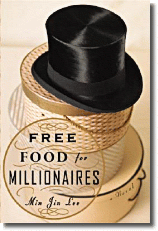We live in a returnable, refundable, rebatable world. If you don't like your new stereo, box it up and bring it back to the shop. If those new shoes, bought from a catalog, don't fit like you expected, send them back. If dinner wasn't perfect, lobby your waiter for a free dessert. If you are unhappy with your spouse, well . . . divorce him or her and start looking for a new one. All of this returning makes us less, not more happy and fulfilled, according to Barry Schwartz in his book Paradox of Choice.

According to Schwartz, we think there is always something better behind "Door Number 2" in our society. We might be better off if we learned to live with what we've got. We might learn to love the foibles of our new television, rather than plotting its return, if we knew we were stuck with it. We might be more forgiving of our spouse's quirks if we were going to live with them for the rest of our lives.
In the past few months, I've been ruminating about these issues in a slightly different way. Could the publishing business and bookstores be more profitable, and thus happier, if they started moving away from a returnable model? Right now, 90% of the new books the bookstore buys can be returned to the publisher for credit.
I'll be the first to admit, this results in over-buying and it leads book buyers to have very little patience once the books are in the store. If a new hardback hasn't started selling in the first few weeks, I'm already contemplating its return. By two months, I've seen enough: it's outta here. There's no commitment. There's no love. If we truly owned those books, I'd try a lot harder to sell them. We would discount them, we would turn them into used books, and we would stack them on the remainder tables. It wouldn't exactly be love, but it might be more profitable if the publisher were providing some incentive for buying on a non-returnable basis.
We are at the beginning of a new buying season, and I've been asking all the reps what their publishers' terms are for purchasing non-returnable. You'd figure that buying and not returning would be something that publishers would want to encourage. After all, publishers are swamped with returns and often sell them for pennies on the dollar to remainder companies.
The publishers offer greatly varying incentives. Hachette (formerly Time Warner) has a generous non-returnable discount, but Penguin and W.W. Norton just give the tiniest smidgen of an extra discount for buying books as non-returnable. When I asked the Norton rep about this she had a reasonable explanation. Norton is a publisher whose livelihood depends on the sales of midlist books: those with smaller print runs, such as more literary novels and those by first-time authors. So Norton fears that if stores buy on a non-returnable basis, they would be less likely to take a risk on these titles. This is a legitimate concern, but surely there must be some way around it. Perhaps, the discount on the whole order could be tied to the percentage of these midlist titles that a store is willing to buy.
With Hachette's extra discount, plus the savings in freight from not shipping hundreds of books back, we can come out ahead, even if we don't change our buying methods. Everyone would win. According to my calculations, which are based on how many books we return and common sense, if a major publisher offered an extra 6% discount, that would usually make it worthwhile to buy non-returnable.

I have another reason, beyond pure profit, that I'd like to see the industry go towards non-returnable incentives. It seems criminal to me to be shipping these books back and forth and back across the country. That's a lot of fuel, in a time when oil seems especially costly. It's no accident that we are at war in Iraq and that drilling in the Arctic comes up every year. We are also cutting down a lot of trees for books that no one wants. It is with rueful irony that I noticed that deforestation is one of the major factors failed societies have in common with each other, according to Jared Diamond's Collapse.
Z is for Zorro and his travels
Here's an example of the current system: We are selling Isabel Allende's hardback Zorro as a remainder at the store. That book was originally shipped from HarperCollins' Scranton, Pennsylvania warehouse to a bookstore, perhaps on the West Coast. The store then shipped it back to Scranton, and then Harper sent it to a remainder company in Georgia. Finally, the remainder warehouse sent it here to Boulder, Colorado. Now we are trying to sell this pound of paper for less than $8. Wouldn't we all be better off if this tree were still in the forest? How much do you think UPS made on the deal? By the way, Zorro, as a new paperback, is selling at a disappointing rate. What a surprise.
What if the book were sold by Harper at a better discount? The original west coast store could have either ordered fewer books to start, or cut the price and made a display out of them once they realized that they had too many. Instead, they -- like us -- packed up a perfectly salable book and returned it. Buying non-returnable would have saved an awful lot of money for the store and for Harper, and it would have been more profitable for all involved -- except UPS and the remainder company.






